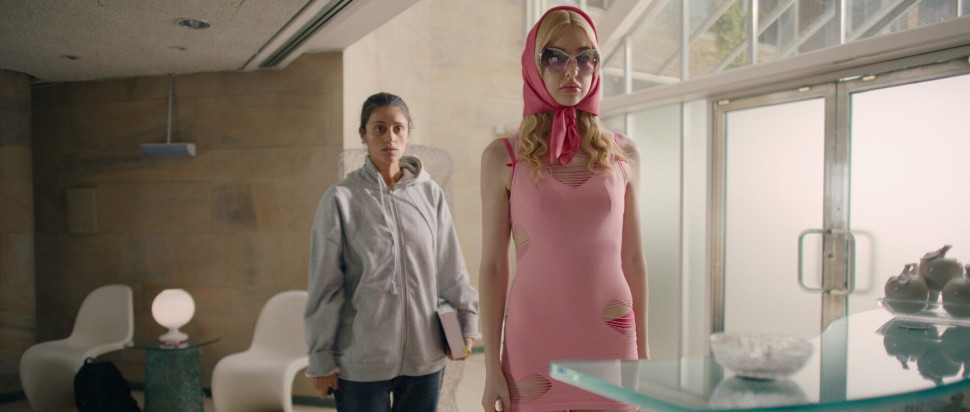Scotland on Screen: Edinburgh Film Festival 2025
This year's Sean Connery Prize for Feature Filmmaking Excellence at Edinburgh Film Festival unearthed a mixed bag of work, with a few glimmers of talent and invention to be found
There’s a lot riding on Edinburgh International Film Festival’s Sean Connery Prize for Feature Filmmaking Excellence, and I’m not just talking about its ample £50,000 winner’s fund. In many respects, it’s the centrepiece of the 'revitalised' festival. “Ever since day one, one of the principles behind our selection has been this idea of securing high-quality world premieres,” EIFF's director Paul Ridd told me a few days before his second edition in charge.
Having now seen eight of those ten world premieres in competition, it seems to me Ridd is still a ways off from achieving that dream. But perhaps this is to be expected. Major festivals can often struggle to secure strong competition titles, so it’s no surprise that Edinburgh, a festival that’s in the middle of rehabilitating its industry credentials, might not be attracting the most exciting new works of international cinema, especially with an insistence on only considering world premieres for entry – even the competitions at the Berlinale and Cannes have more relaxed attitudes to exclusivity.
Several films began with much promise but failed to stick the landing. Jesse Noah Klein’s Best Boy, for example, opens confidently on a family in mourning. Their exacting patriarch has died, but not before leaving word that his three adult offspring have to recreate the bizarre and abusive family competition they were made to play as children to crown the 'best boy' and win their $100,000 inheritance. Taking place over a single day in and around the family’s woodland cabin, the competition mixes physical endurance with psychological torture, and after each round, a winner is crowned and the other two have to strip naked and recite a humiliating chant proclaiming themselves losers. When structured around this surreal tournament, Klein’s film is blackly comic and pleasingly bizarre, but its intensity dissipates when it becomes clear there’s little meat on the story’s bones beyond the high-concept setup. As Best Boy drags to its close after exhausting its best ideas, Klein unleashes a series of clichés (a fire, a cathartic kiss, a character plunging into a cleansing lake) in lieu of a satisfying resolution.
The most visually striking work in competition was Ondine Viñao’s Two Neighbours. Inspired by Aesop’s fable of greed and envy, Avaricious and Envious, it’s a wild satire that takes place across a chaotic party at a lavish country house and concerns the rivalry between Stacy (Chloe Cherry), a vapid socialite whose father is throwing the party, and Becky (Anya Chalotra), a struggling writer with a chip on her shoulder. It’s a film of excess, with bold production design, finely-detailed costuming and enough supporting characters, including a real-life genie (an underused Ralph Ineson), to fuel a mini-series. The maximalism is clearly the point, but Viñao’s film is so cluttered with side-plots that she neglects the fable’s central premise for most of the runtime.
Campbell X's second feature, Low Rider, was one of EIFF's most anticipated titles, but it was a crushing disappointment in comparison to his sparky 2012 debut, Stud Life. Very little works in this shaggy road movie following Quinn (Emma McDonald), a young woman from London travelling across South Africa in search of her estranged father. Ploddingly paced, clunkily written and cloyingly sentimental, the film takes Quinn, a deeply unlikeable and boring protagonist, on a series of life lessons exploring big issues like racism, identity, and self-love, but these trite eddies rarely rise above the superficial.
It wasn’t all bad, though. The biggest buzz was generated on the ground by Blue Film, the debut from LA-based filmmaker Elliot Tuttle. It’s easy to see why it got audiences talking. Shot on a shoestring and taking place over one long night of the soul, it takes the form of a series of charged conversations between two characters. One is Aaron (Kieron Moore), a macho camboy who specialises in humiliating his fans with homophobic slurs; the other is the middle-aged Hank (Reed Birney), who’s spending $50,000 for a night of Aaron’s company. It’s quickly revealed, though, that Hank is Aaron’s former teacher who was convicted of sexually assaulting one of his pupils. Unflinching in its exploration of both men’s sexuality, the film is uncomfortable viewing, but intentionally so, refusing to look away from troubling taboos. Both actors give committed performances, and Tuttle does just enough with framing and blocking to keep this talky film dynamic. Not perfect by any means, but Blue Film marks Tuttle out as a daring new voice in queer cinema.
The most accomplished film I saw in the competition was Mortician from veteran Iranian filmmaker Abdolreza Kahani. With no funding or crew, Kahani wrote, directed, edited and shot the film himself on his iPhone with a handful of actors in a production style he describes as “one-person cinema.” The filmmaking may be impoverished, but it’s rich with visual invention. It centres on a lugubrious mortician, who specialises in the Islamic tradition of washing corpses before burial, and the friendship he forms with a dissident Iranian pop star who’s in hiding in the snowy outskirts of Montreal. Superficially, Mortician is an odd-couple comedy, but it has some devastating left turns that remind us of the real-world dangers for people under the eye of the Iranian regime. It clearly stood out to EIFF’s audience too, and walked off with the £50,000 prize – it's exciting to think what this resourceful filmmaker will make next with his bounty.
The 2025 Edinburgh International Film Festival ran 14-20 Aug
